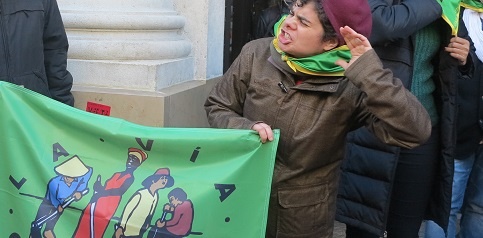Celebration of 25 years of food sovereignty and the movement we built around it

Opening Intervention by Paula Gioia in the Virtual General Meeting of the International Planning Committee for Food Sovereignty (IPC), 21 April – 18 May 2021
Food sovereignty emerged in 1996 as a paradigm shift to the struggle against hunger and poverty, with the clear understanding that without food sovereignty there is no genuine food security, so it is the pre-condition for food security.
This was around 3 years after the creation of the global peasants’ movement, in a context when social movements and civil society organizations concerned by food issues started to coordinate themselves with the aim to counterbalance the neoliberal power threatening local food markets, the environment and ultimately human rights of local communities….
We had the clarity that food production should prioritize the local needs, instead of the global markets, and that food producers deserve fair incomes. Furthermore, the control over the food system must be in the hands of the ones who produce and consume food, not in the hands of the private capital. In the same line food must not be used as a weapon!
Food sovereignty also joined hands with the right to food, seeing food as a basic human right. This means that everyone on this planet must have access to safe, nutritious and culturally appropriate food in sufficient quantity and quality to have a healthy and dignified life.
Furthermore, there was from the beginning a clear understanding that the implementation of agrarian reforms and the non-discrimination to access land are key elements to allow food sovereignty to turn into a reality. In the same line the protection of natural resources through agroecological practices is also a basis for food sovereignty.
With all this understanding in 1996, the first seeds for the formation of the IPC and the broader food sovereignty movement were sown. The IPC was created some years later and the organized social movements started to influence different global governance spaces, bringing their vision and ideas from the ground and demanding the democratization of policy making processes.
We had strong moments to organize ourselves, to update our analysis and to reaffirm our commitment with our joint struggle. The Nyeleni Forum in 2007 and Agroecology Forum in 2015, both in Mali, were such spaces.
We had several achievements over the past 25 years:
- Voluntary Guidelines on the Right to Adequate Food
- The Committee on World Food Security (CFS) reform
- Voluntary Guidelines on the Responsible Governance of Tenure of Land, Fisheries and Forests in the Context of National Food Security
- Participation in the Convention on Biological Diversity (CBD)
Nevertheless, the current context of the COVID19 pandemic has increased the social crisis of the world today. And the worker classes have their rights under threat, unemployment, corruption, misery, hunger and violence have increased.
But the crisis is even broader: climate, environmental, economic, democratic, health and also food crisis. In such a context the transformation of the current agriculture and food model is essential to achieve the urgent paradigm shift, changing the dominant capitalist relations of production.
Today, as in 1996, food sovereignty remains as the most coherent solution for a systemic shift, it remains the most coherent proposal to guarantee access to local and nutritious food for all and to defend peasants’ and people’s rights.
Peasants, indigenous communities, small scale fishers, pastoralists, waged workers need to be involved in the formulation of solutions, we need to be part of policy making processes. And we cannot allow that the dominant forces that are strongly working to reshape governance spaces turn the table. This is not a game! Life is at stake!
So, it is indeed time to celebrate the 25 years of our joint struggle for food sovereignty, but much more, it is time to recharge our energies and to reaffirm our commitment, using the convictions, spaces and alliances we built since 1996, to strongly fight for a world based on solidarity, justice and dignity – especially considering our future generations.
What do we want? – Food Sovereignty!
When do we want it? – Now!
